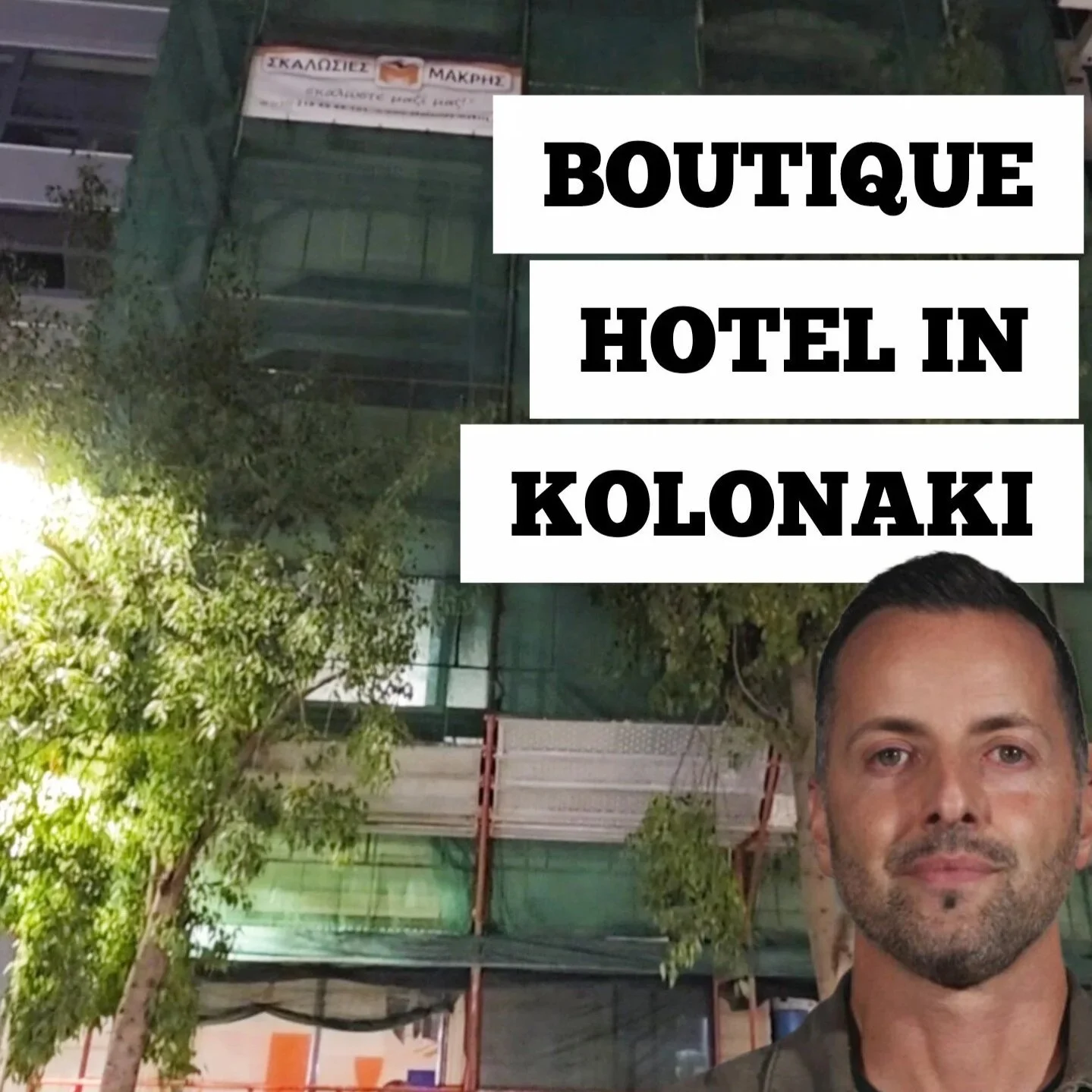IS GREECE IS TOO EXPENSIVE FOR FAMILY TRAVEL?
IS GREECE IS TOO EXPENSIVE FOR FAMILY TRAVEL?
I visit Greece every year with my family — it’s a tradition we cherish. But this year, something felt different: it was significantly more expensive.
Flights are pricey, sure—but the real shock comes once you're in the country. Ferries that once cost €30–€50 per person are now over €200 round-trip, even on standard routes. And hotel rates have surged, with some rooms now exceeding €1,000 per night—not for ultra-luxury, but for regular accommodations in popular destinations.
As someone who has seen Greece evolve year after year, I can say this confidently: the price point has shifted dramatically. And that’s tough—especially for families who want to experience the country in an authentic, meaningful way without blowing their budget.
Greece used to strike the perfect balance: rich culture, incredible food, and family-friendly affordability. But now, it risks becoming a destination only accessible to high-spending travelers. That’s not sustainable—not for families, not for repeat visitors, and not for regional economies that rely on more than just luxury tourism.
Yes, Greece is still breathtaking. But it’s time for a serious conversation: Who are we building this tourism economy for—and who are we leaving behind?
“Who are we building this tourism economy for—and who are we leaving behind?”
ADVICE ON HOW TO PLAN AN ECONOMICAL TRIP TO GREECE
Greece doesn’t have to break the bank — but it takes strategy, flexibility, and planning ahead. Here’s how to do it smart:
1. Travel in the Shoulder Seasons
Avoid July and August. Instead, go in May–June or September–October when:
Flights and hotels are cheaper
Temperatures are ideal
Crowds are thinner
You'll experience more — for less.
2. Skip the Tourist Hotspots (or Limit Your Stay)
Santorini and Mykonos are beautiful, but also the most expensive.
Instead:
Stay in Naxos, Paros, or Crete for island charm at half the price
Explore the mainland: places like Nafplio, Monemvasia, Kalamata, and Pelion offer rich history, food, and beaches without the markup
3. Use Vacation Rentals or Family-Run Guesthouses
Airbnb and Vrbo offer multi-night discounts and kitchen access (save on food)
Family-run "xenonas" and guesthouses are warm, affordable, and authentic
Consider staying just outside major towns for even better rates
4. Limit Ferry Hops
Ferries have gotten pricey — over €200 for some routes.
Choose 1 island instead of 3
Look for direct ferries to save on transfers and time
Or skip the ferry altogether and explore the mainland by car or bus
5. Eat Local, Eat Smart
Greek street food (gyros, souvlaki, spanakopita) is cheap and delicious
Tavernas over tourist traps — family-run places offer better value and bigger portions
Cook breakfast or dinner at your rental to save for a few special meals out
6. Use Public Transport & Regional Flights Wisely
Buses between cities (KTEL) are reliable and inexpensive
Flights from Athens to islands like Crete or Rhodes can be cheaper than ferries if booked early
Rent a car only where needed — and share it if traveling in a group
7. Book Everything in Advance
Secure flights, ferries, and hotels 3–6 months out for the best pricing
Use tools like Google Flights and Skyscanner alerts
Check ferry aggregators like Ferryhopper for deals and route options
IF I HAVE NO BUDGET, WHAT IS THE BEST WAY TO EXPERIENCE GREECE?
1. Charter a Private Yacht to Explore the Islands
Skip ferries. Fly into Athens, and board a private yacht or catamaran to tour the Cyclades, Ionian, or Dodecanese islands at your own pace.
Visit hidden coves and private beaches no commercial route touches
Dock overnight in Mykonos, Paros, or Hydra for sunset dinners and nightlife
Have a private chef onboard and explore Greece by sea, like the locals of old
⛵ Pro tip: Charter with a crew who knows local tavernas, swimming spots, and off-grid gems.
2. Stay at Ultra-Luxury Properties With Exclusive Experiences
Book the top-tier suites and villas at:
Amanzoe (Porto Heli) – Peace, privacy, and helicopter transfers
Canaves Oia Epitome (Santorini) – World-class sunsets and fine dining
Kalesma Mykonos – Design-forward and completely serene
The Romanos, Costa Navarino – Unmatched service, beachfront, golf, spa
💡 Many offer access to private archeological tours, helicopter day trips, or yacht rentals.
3. Fly Private or Use Helicopter Transfers
Avoid commercial flights and island ferry delays.
Charter private flights or helicopters between Athens, islands, and remote destinations
Save hours and arrive refreshed
Get aerial views of ancient ruins and dramatic coastlines
4. Book a Personal Guide for History, Culture & Mythology
Hire experts to walk you through:
The Acropolis at sunrise before it opens
Delphi or Mycenae with an archaeologist
Sparta with a historian, exploring Leonidas’ legacy and real-life Spartan values
Private tours of wineries, olive groves, and monasteries
📜 You won’t get this from a brochure.
5. Eat Beyond the Menu
Book chef’s table dinners in Athens, Santorini, and Crete
Arrange private meals in mountain villages or seaside homes with local cooks
Hire a private chef for your villa to do a regional tasting experience (think Cretan, Cycladic, and Northern Greek nights)
🍷 Pair each meal with hand-selected Greek wines from boutique vineyards.
6. Dive Into Wellness & Longevity Rituals
Book multi-day wellness retreats in places like Evia, Zakynthos, or Costa Navarino
Access ancient healing traditions, thermal baths, and modern spa science
Consider a custom-designed itinerary focused on body, sleep, mindfulness, and food
🧘 Greece offers luxury rooted in ancient healing culture.
7. Get Personal Access to Art, Design & Culture
Private art showings and studio visits in Athens
Custom experiences at institutions like the Benaki Museum or Acropolis Museum
Meet with local designers, architects, and makers shaping modern Greek identity
🎨 Combine luxury with intellectual and creative engagement.
✨ Final Thought:
When money isn’t the limitation, depth becomes the luxury.
Use that freedom not just to upgrade your experience — but to unlock the rare, meaningful, and unforgettable.
HOW HAS THIS INCREASE IN PRICING AFFECTED LOCAL RESIDENTS?
The rising cost of tourism in Greece hasn’t just affected travelers—it’s impacting local residents in serious and long-term ways.
🏠 1. Housing Costs Have Skyrocketed
Platforms like Airbnb have pushed short-term rentals to the forefront in tourist-heavy areas (Athens, Santorini, Mykonos, Chania), driving up housing prices and reducing availability for locals.
Many landlords prefer short-term profits over long-term tenants
Locals, especially young families and seasonal workers, are being priced out of their own neighborhoods
In some islands, teachers and nurses can’t find housing for the summer season and are forced to leave or commute from other towns
🍽️ 2. Cost of Living Has Risen Across the Board
As businesses cater to wealthier tourists, prices for basic goods and services rise—not just in restaurants and hotels, but in grocery stores, gas stations, pharmacies, and public transport.
What used to be local-friendly tavernas now price their menus for visitors
Essentials like meat, dairy, and fresh produce have seen spikes in high-tourism areas
Locals end up working in an economy where their wages don’t match the inflated costs
💼 3. Economic Dependence on Tourism Has Grown Risky
Greece has leaned heavily on tourism for recovery, but:
Local economies become seasonal and unstable
Jobs are often limited to hospitality, retail, or service work—with little long-term security
When tourism dips (due to global events, weather, or costs), locals are the first to feel the strain
🧑💼 4. Generational Disconnect Is Growing
Many younger Greeks are unable to afford staying in their home villages or islands:
They leave for cities—or abroad—in search of better opportunities
The cultural and family fabric of small towns erodes
Meanwhile, some regions become “ghost towns” in winter, only populated by tourists in summer
✅ What Can Be Done? (For Industry Stakeholders and Travelers Alike)
For the Greek government & municipalities:
Incentivize long-term rentals over short-term gains
Implement zoning or caps for tourist rentals in sensitive areas
Support vocational training and employment diversification beyond tourism
For travelers and developers:
Choose locally owned accommodations
Support year-round destinations to spread tourism evenly
Tip generously and engage respectfully—your presence affects real lives
If you're investing in hospitality, balance profit with impact
💬 Final Thought:
Tourism is vital to Greece—but unchecked price hikes and luxury-focused development risk pushing out the very people who give Greece its warmth, culture, and authenticity.
We need sustainable travel models that work for everyone—not just for visitors, but for the locals who live there year-round.





















